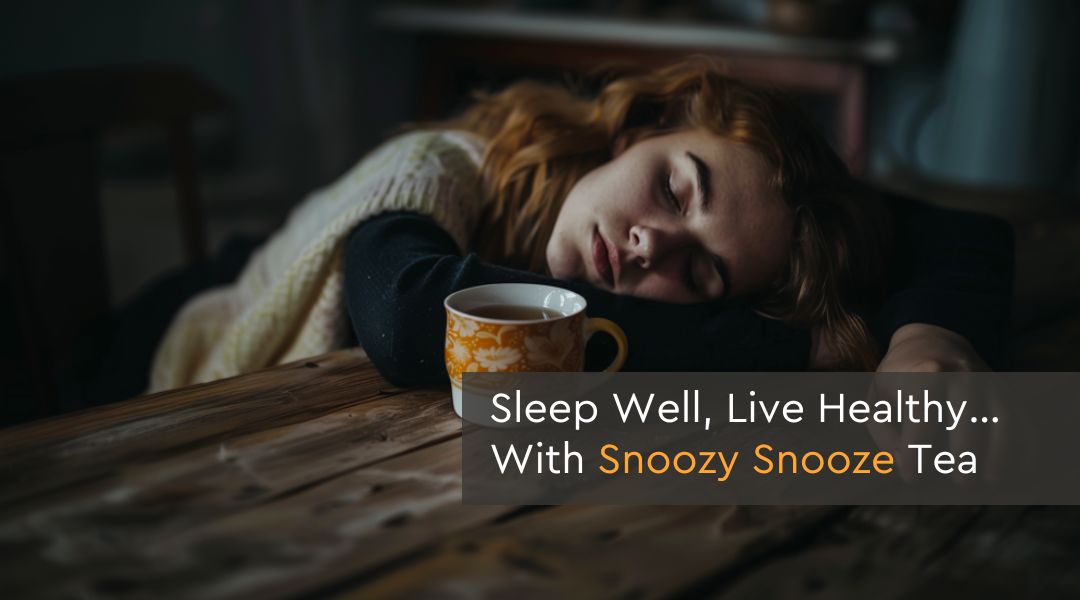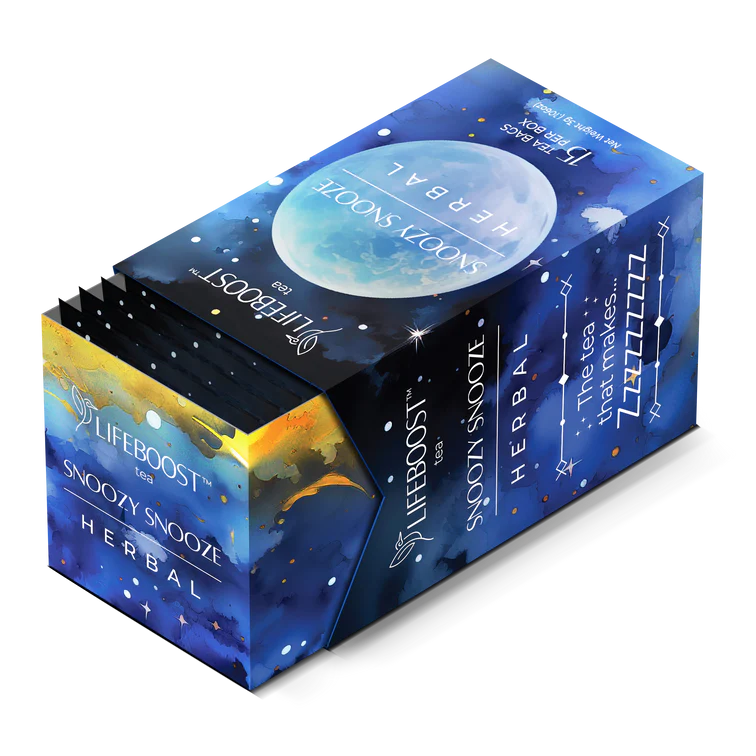
Sleep Well, Live Healthy…With Snoozy Snooze Tea
Want to improve the health of your heart? Get better sleep.
Notice that your ability to pay attention, learn, and remember is slipping? Take a look at your sleep habits.
Looking to improve immune health? Incorporate a healthy sleep routine.
Need to better manage your weight? Be sure to include quality sleep in your lifestyle changes.
Yes, all of these things listed above (and more) are directly linked to sleep!
Yet, how often do we view sleep as a valid part of the equation when seeking to improve our overall health and wellness?
When looking to improve our health, we’re often familiar with exhortations to eat more nutritious foods, drink more water, or get in more physical activity, but one of the greatest needs for whole body health is quality, restful sleep!
When you sleep, you are essentially taking a needed break, but during those hours of shut-eye, your body is actually very busy.
And, this is where whole body health comes in…
We’ll get into the details in a moment, but during sleep, your body resets, repairs, reorganizes, and readies many organs and body systems for the duties they must perform to keep you alive and healthy!
Unfortunately, roughly 1 in 3 adults confess that they do not regularly get a needed amount of sleep.
- Some folks have trouble falling asleep, lying awake for hours on end before drifting off for only a few short hours.
- Others may fall asleep quickly, but wake several times throughout the night, which prohibits the body from entering needed cycles of sleep.
- Still others find that shut-eye eludes them entirely.
And, this is why we’re adding a powerful, natural, sleep aid to our line of clean, healthy teas…one we like to call Snoozy Snooze due to this tea’s ability to help you do just that - snooze!
So, let’s jump right in, exploring the role of sleep in overall health as well as how Lifeboost Snoozy Snooze Tea can aid in your quest for quality shut-eye!
Healthy Sleep Habits

Why do we need sleep?
This was a question I often asked my parents when I was young, and I can remember their repetitious answer vividly, “sleep will help you grow.”
Being a fairly short child who frequently lamented my lack in stature, this often quieted my bedtime protests, but my parents later confessed they only told me this to get me to go to bed without any pleas for pushing back the nighttime clock.
Now, whether they realized this or not back then, there actually was a lot of truth to their advice as sleep does in fact aid in growth, but this only scratches the surface.
You see, as we go on about our day, there’s a reason we all eventually get tired.
As we live and breathe and enjoy life, our body’s systems, organs, and even cells, are actually very hard at work.
To illustrate this, let’s look at the smallest unit of life, our cells.
Throughout any given day, your cells:
- take in nutrients from the foods you eat
- make energy
- provide information to your brain
- build proteins
- dispose of waste
Unfortunately, the byproducts of all of these processes (and more) can cause damage which hinders the overall functionality of your cells (and tissues, organs, etc).
And, this is where sleep comes in…
During sleep, your body:
- removes the waste products of everyday internal processes
- heals or repairs the damage incurred through such actions
- provides fuel for cells to carry out normal functions
Then, aside from the work done in and to your cells during sleep, the following also takes place:
- Your brain removes toxins.
- Your brain stores the information you’ve read or encountered throughout the day.
- Nerve cells reorganize and communicate.
- Needed hormones and proteins are released.
- Energy is conserved and stored for use in the hours you’re awake.
- Muscles are repaired.
- The tissues within your body grow.
- Brain activity increases with the precise purpose of regulating emotions.
- Hormones which signal hunger are regulated.
- Your cells’ ability to take in glucose improves (which protects against insulin resistance).
- Antibodies, immune cells, and those proteins needed to fight inflammation and infection are produced.
And once again, this all takes place during quality, restful sleep.

On the flip side of this, when we regularly lack good sleep, the risk of heart disease, high blood pressure, obesity, diabetes, premature aging, impaired brain function, infection, and inflammation increases.
So then, what does quality sleep look like, and how can you achieve it?
As you sleep, your body ultimately transitions between several cycles, and each cycle includes 3 stages of REM (rapid eye movement) sleep and one stage of non-REM sleep.
When these stages are limited, delayed, or interrupted, your body can’t accomplish the needed work of repairing, rewiring, restoring, and removing toxins or waste build up, and therefore your health suffers.
Experts agree that adults need at least 7 hours of uninterrupted sleep each night to complete an ample number of cycles for accomplishing these needful tasks, and thankfully they’ve also found some tried and true ways to best facilitate this type of rest.
- First, avoid using your bedroom for other activities throughout the day. For instance, if you work from home, refrain from doing computer work in your bed or bedroom as this can essentially confuse your brain, making it harder to fall asleep at bedtime.
- In other words, when you use your room for things other than sleep, your brain is less likely to associate your bedroom with rest, frustrating your attempts at snoozing later in the evening.
- Keep your bedroom free of clutter, as this can prevent your mind from the peace and calm required for a good night of sleep.
- Incorporate exercise into your daytime routine as this has been shown to improve your nighttime sleep quality.
Then, as nighttime nears, you can help your body know when it’s time for sleep by implementing a nightly routine, a set list or grouping of actions you complete each night to aid in healthy sleep.
- Try to go to bed at the same time each night.
- Seek to refrain from using electronics within 2 hours of bedtime. And, if you must use such devices, plan to use blue-light blocking glasses to reduce the sleep-harming effects of this type of light.
- Avoid alcohol, caffeine, and large meals a few hours prior to bedtime.
- Take a warm bath in the evening.
- Instead of watching television or scrolling on your phone, seek to read calming material prior to sleep (avoid anything too stimulating).
- Switch over to soft lighting if you’re able to as bedtime draws near (think candlelight, soft light from a nightstand lamp, etc).
- Practice deep breathing or meditation.
- Make sure to keep your bedroom at a cool, sleep-conducive, temperature (between 60-67 degrees fahrenheit).
- Have a warm beverage such as a calming tea prior to sleep.
Snoozy Snooze Tea
They Said It Couldn't Be Done: A Tea That Whispers 'Goodnight' Like a Lullaby. – It's Not Just Tea, It's Sleep's Secret Weapon.
Shop Now
And, with that last pre-bed, healthy-sleep, suggestion, let’s transition into some information about an amazing calming tea option we have absolutely fallen in love with…one we think you’re going to love too!
What Is Snoozy Snooze Tea?

Snoozy Snooze Tea is a doctor-crafted, natural, calming tea made with quality, restful sleep in mind.
Its aroma is best described as the scent which wafts through the air as a gentle breeze blows through a field of lavender.
Its effects evoke thoughts and words such as zen, calm, serenity, peace, tranquility, and comfort. But ultimately, we chose the name Snoozy Snooze because each and every one of us who’ve tried it have enjoyed calmingly sweet, all-night-long, snooze sessions.
Even better, after a night of uninterrupted Snoozy Snooze Tea induced sleep, you wake up truly rested and feeling fully refreshed.
In fact, we’ve been so amazed by this tea, we’ve even called these results a Snoozy Snooze miracle!
But, while all that sounds good, great, and grand, especially if you have trouble sleeping or experience lethargy and fatigue due to poor quality sleep, the bottom line is…ingredients matter!
So, what is it about Snoozy Snooze Tea that makes this such a huge nighttime blessing?
Are there any other benefits to be reaped from this tea?
And, how can you know if Snoozy Snooze is right for you?
First, let’s list what’s not in Snoozy Snooze Tea…
- No additives
- No habit-forming substances
That’s a win already, but wait until you see the list of powerful ingredients that do, in fact, make up this sleepy-time miracle!
1- EZ GABA

GABA (Gamma-aminobutyric acid) is a neurotransmitter that plays a crucial role in regulating sleep, mood, and relaxation.
EZ GABA is quick acting, long lasting, non addictive, all natural, and it’s been found to:
- reduce nervous system excitability to help you fall asleep faster, improve sleep quality, and prolong stages of deep sleep where most restorative work is carried out in the body
- enhance mood regulation, even potentially alleviating symptoms of depression and anxiety
- potentially inhibit stress responses to help reduce stress markers in challenging situations
- promote a state of relaxation as it calms the nervous system
- be an effective course of treatment for some cases of insomnia
- influence muscle relaxation
- improve overall cognitive functioning
2- Sweet Orange Powder

Sweet orange powder is derived from Citrus sinensis, or sweet oranges.
Many have used sweet orange in a concentrated extract or oil form both in aromatherapy as well as ingestion (such as this powder).
Scientists have found sweet orange to aid in sleep for the following reasons:
- Sweet orange contains compounds such as limonene and myrcene, both of which have sedative properties.
- It’s linked to the release of neurotransmitters which are associated with mood regulation, and this also has a calming effect.
- The aromatic compounds in sweet orange can lower cortisol levels, reduce stress, and calm the nervous system. In other words, be sure to fully savor each cup of Snoozy Snooze tea by slowly inhaling its wonderful fragrance as well.
- The flavonoids in sweet orange contribute to feelings of relaxation and calmness.
- Some compounds in sweet orange interact with brain receptors similar to how antidepressants work, and while studies are still needed to confirm this correlation, this interaction does suggest potential antidepressant properties.
- The antioxidants in sweet orange support a healthy brain by reducing oxidative stress.
3- Organic Lavender Powder

Most people are aware of lavender’s calming effects, but there’s much more to gain from this powerful flower.
Researchers have found lavender to:
- relax muscles and increase slow-wave sleep to improve overall sleep quality, especially in those who experience sleep disturbances and insomnia
- reduce symptoms of depression, regulate serotonin, and improve mood
- reduce anxiety levels as well as heart rate due to compounds such as linalool
- calm the nervous system to produce a mild sedative effect, inducing relaxation
- alleviate discomfort, even reducing symptoms of restless leg syndrome, a condition which disrupts sleep for many
- potentially improve focus and concentration, which contributes to feeling refreshed and focused when you wake the next morning
4- Organic Reishi Mushroom

Reishi has long been used in Eastern Medicine for its numerous benefits to overall health and wellness, but it’s been specifically studied for its effects on sleep, including:
- sedative effects on the nervous system, promoting calmness and relaxation
- mood regulation, even decreasing symptoms of depression, due to its ability to influence neurotransmitter levels
- adaptogenic effects which help manage stress and reduce anxiety
- mind-calming effects as well as reductions in feelings of agitation and restlessness
- support for overall brain and nervous system health, both of which are vital during those restorative processes which occur during sleep
5- Magnesium Glycinate

This is a form of magnesium which is bound to the amino acid glycine. It is highly bioavailable, meaning your body can easily use it, and it is most often studied for its sleep enhancing effects, such as its ability to:
- influence the pathways, neurotransmitters, and hormones associated with mood regulation and stress responses, amplifying its calming effects
- inhibit the effects of the nervous system which induces relaxation
- prevent muscle pain, cramps, and spasms
- aid in nerve functioning as well as support overall nervous system health to avoid or prevent overexcitement
- improve brain health and function
6- MitoPrime

MitoPrime is a trademarked form of L-Ergothioneine which is a powerful antioxidant primarily found in organ meats and some types of mushrooms.
Studies have shown MitoPrime to be 3-30 times better than glutathione, vitamin C, and coenzyme Q10.
Its benefits to sleep are indirect, but powerful, as you can see:
- MitoPrime’s ability to reduce oxidative stress contributes to overall (or general) health, which in turn promotes healthy sleep.
- It has anti-inflammatory and neuroprotective properties which are linked to improvements in brain health, which in turn aids in overall regulation of mood.
- By reducing oxidative stress and inflammation, the effects of stress are reduced thereby aiding in relaxation.
- Its benefits to mental health may indirectly improve sleep as poor emotional health can rob sleep time and quality.
- It has been linked to improvements in cardiovascular health which may lower stress levels, and reduced stress is associated with improvements in sleep and mood.
Wow, that’s a lot of healthy sleep-promoting power!
But, we’re also aware that many of you may already enjoy a calming cup of chamomile tea prior to sleep, so let’s close out by comparing these two sleep-enhancing teas so you can decide which brew is right for you.
Snoozy Snooze Vs Chamomile, Which Is Right For You?

We’ve just looked at the components and benefits of Snoozy Snooze Tea as they relate to sleep, but how does it compare to chamomile tea?
To help you properly choose which tea is best for you and your needs, let’s review the most notable components and benefits of chamomile tea before doing a side by side comparison.
First, chamomile tea is simply made from chamomile flowers.
And, these flowers have a mild sedative effect which promote relaxation and aid in sleep, although they have not been found to aid in the battle against insomnia.
This mild sedating property has also linked chamomile tea to feelings of calmness, reductions in anxiety levels, and a decrease in symptoms of depression.
Research has shown chamomile flowers to have an anti-inflammatory and antispasmodic effect, and while this typically is associated with improving menstrual cramp symptoms, this can also aid in sleep for those experiencing restlessness due to such symptoms.
Regularly drinking chamomile tea has been linked to lower levels of oxidative stress, which as we’ve seen in detailing the benefits of Snoozy Snooze tea, this can improve overall sleep quality.
Many folks don’t realize how much digestion is linked to sleep, and chamomile tea provides benefits here as it is considered a powerful digestive aid. So, by reducing gastrointestinal pain, flatulence, and upset stomach, sleep quality improves.
But, it is also important to note that drinking excessive amounts of chamomile tea has been linked to complications in pregnancy.
And, those people with allergies to flowers in the aster family may be allergic to chamomile.
Those individuals taking blood pressure lowering medications may also have an adverse reaction to chamomile tea as the tea can naturally lower these levels (compounding the effects of medication).
But, as you can see, chamomile tea does have many of the same sleep aiding properties as Snoozy Snooze Tea, so let’s do a side by side comparison as we wrap things up.

*Please consult with your physician prior to consuming either of the above teas if you are currently taking medications, are pregnant, or have specific floral allergies. (This also pertains to use for children.)
Snoozy Snooze Tea
They Said It Couldn't Be Done: A Tea That Whispers 'Goodnight' Like a Lullaby. – It's Not Just Tea, It's Sleep's Secret Weapon.
Check out Lifeboost Coffee Snoozy Snooze Tea.
Medical Disclaimer
This content is for informational and educational purposes only. It is not intended to provide medical advice or to take the place of such advice or treatment from a personal physician. All readers/viewers of this content are advised to consult their doctors or qualified health professionals regarding specific health questions. Neither Dr. Charles Livingston nor the publisher of this content takes responsibility for possible health consequences of any person or persons reading or following the information in this educational content. All viewers of this content, especially those taking prescription or over-the-counter medications, should consult their physicians before beginning any nutrition, supplement or lifestyle program.

Becky is a mother, educator, and content writer for Lifeboost Coffee. She has had three years’ experience as a writer, and in that time she has enjoyed creatively composing articles and ebooks covering the topics of coffee, health and fitness, education, recipes, and relationships.
- https://www.sleephealth.org/sleep-health/the-state-of-sleephealth-in-america/#
- https://www.ncbi.nlm.nih.gov/pmc/articles/PMC9449320/#
- https://newsinhealth.nih.gov/2021/04/good-sleep-good-health
- https://health.ucdavis.edu/blog/cultivating-health/better-sleep-why-its-important-for-your-health-and-tips-to-sleep-soundly/2023/03
- https://www.healthline.com/health/why-do-we-sleep#what-happens-during-sleep
- https://www.ncbi.nlm.nih.gov/books/NBK19961/#
- https://www.mayoclinic.org/healthy-lifestyle/adult-health/expert-answers/how-many-hours-of-sleep-are-enough/faq-20057898
- https://www.nhlbi.nih.gov/health/sleep/stages-of-sleep#
- https://www.sleepfoundation.org/sleep-hygiene/what-is-healthy-sleep
- https://www.cdc.gov/sleep/about_sleep/sleep_hygiene.html
- https://health.clevelandclinic.org/put-the-phone-away-3-reasons-why-looking-at-it-before-bed-is-a-bad-habit
- https://health.clevelandclinic.org/what-is-the-ideal-sleeping-temperature-for-my-bedroom
- https://www.medicalnewstoday.com/articles/320031#benefits
- https://www.healthline.com/nutrition/5-benefits-of-chamomile-tea
- https://kinfertility.com.au/blog/does-chamomile-tea-help-sleep#
- References for the article to confirm data and information.
Drop a Comment
How many teabags per box, for $30??









